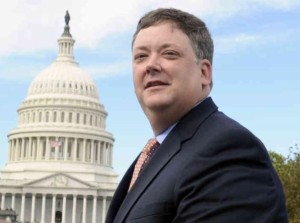SCOTUS decision opens political pocketbooks, but will it help transparency?

By Johnny Kampis | Watchdog.org
CULLMAN, Ala. — Republicans praised Wednesday’s U.S. Supreme Court ruling that will allow donors to give more money to more candidates, but some of those who track the money are wary of the change.
In a 5-4 decision in McCutcheon v. FEC, the Supreme Court said individuals should be allowed to spread donations to as many party committees and presidential and congressional candidates as they choose. They’ll still be limited to $2,600 per candidate but could theoretically give that amount to every Republican or Democrat running for U.S. House and Senate.
Previously, donors were limited to $48,600 to candidates and $123,000 in total federal political contributions per two-year election cycle.
MCCUTCHEON: SCOTUS sided with the Birmingham businessman, allowing individuals to give contributions to more candidates.
Alabama Republican Party Chairman Bill Armistead called the ruling a “win for the First Amendment” in a statement.
“This decision will have a massive impact on this year’s elections; donors will no longer be forced to pick between the candidates and committees they want to support,” he said. “It…respects the constitutional right of individuals to decide how many candidates to support.”
The suit was brought by Birmingham businessman Shaun McCutcheon, the owner of electrical engineering firm Coalmont and a frequent contributor to congressional candidates of the Alabama Republican Party.
Supported in the case by the Republican National Committee, McCutcheon argued the Federal Election Commission’s aggregate limits violated his constitutional rights.
RNC Chairman Reince Priebus released a statement saying the decision is “an important first step toward restoring the voice of candidates and party committees and a vindication for all those who support robust, transparent political discourse.”
But some of those who track those donations are worried SCOTUS put too much faith in campaign finance disclosure.
Edwin Bender, executive director of the National Institute on Money in State Politics, said the court’s view of such disclosure as “an antidote to the corrupting influence of political donations and expenditures” relies on a patchwork system of keeping tabs on the money in the 50 states.
“State disclosure systems are fragmented, offer incomplete information or in some cases no information at all,” Bender wrote in an email to Watchdog.org. “The agencies are dependent on lawmakers who control the agency purse strings, and many government disclosure systems are hopelessly mired in twentieth century technology.”
Bender noted his organization’s money-tracking website FollowTheMoney.org was cited to support the court’s argument, but said the site only exists because no government website presents such information for its citizens.
“By relying on nonprofits like FollowTheMoney.org to wind through the campaign finance maze and the black hole of dark money contributions, the Supreme Court is outsourcing the government’s responsibility to ensure transparency in our democracy,” Bender said. “That is wrong.”
SCOTUS: Continues to be divided on the issue of money in politics, with First Amendment arguments winning out.
The SCOTUS decision again revealed a deep rift between liberal justices trying to preserve campaign finance restrictions and conservative justices who argue such limits curb First Amendment rights. The court’s Citizens United v. FEC ruling in 2010 allowed corporate spending on elections.
“There is no right more basic in our democracy than the right to participate in electing our political leaders,” Chief Justice John Roberts wrote in the court’s main opinion. “We have made clear that Congress may not regulate contributions simply to reduce the amount of money in politics, or to restrict the political participation of some in order to enhance the relative influence of others.”
Justice Stephen Breyer argued that “if Citizens United opened a door, today’s decision, we fear, will open a floodgate.”
He said the ruling “overturns key precedent, creates serious loopholes in the law and undermines, perhaps devastates, what remains of campaign finance reform.”
Contact Johnny at johnny.kampis@franklincenterhq.org.







